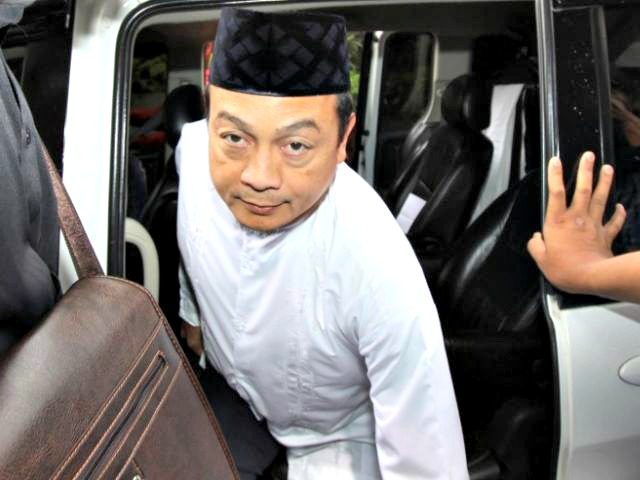Fresh from the outrageous conviction of Jakarta’s governor on trumped-up blasphemy charges, the leader of an influential Indonesian Islamist organization is targeting ethnic Chinese citizens and their money next.
Bachtiar Nasir heads up the National Movement to Safeguard the Fatwas of the Indonesian Ulemas Council, which organized huge protests of angry Muslims against Jakarta governor Basuki Tjahaja Purnama. Widely known by his nickname “Ahok,” the governor is both Christian and of Chinese heritage. He is now serving a two-year prison sentence for allegedly insulting Islam.
“Our next job is economic sovereignty, economic inequality. The state should ensure that it does not sell Indonesia to foreigners, especially China,” Nasir said in what Reuters describes as a “rare interview.”
Nasir called for what Reuters characterizes as “affirmative action” for native Indonesians, complaining that Chinese Indonesians “do not become more generous, more fair” as they accumulate wealth.
“The key is justice, and taking sides. Justice can be applied if there is a preferential option for indigenous Indonesians from a regulation aspect and in terms of access to capital,” he suggested ominously.
Indonesia’s growing Islamist problem is mixed with a long history of racial animosity toward ethnic Chinese, who are derided as greedy, arrogant, and untrustworthy. As Reuters recalls, Chinese citizens and their businesses were targeted during deadly riots in the Nineties, and Chinese Indonesians were barred from holding many public offices.
Modern Indonesia is described as having one of the most unequal distributions of wealth in the world. Ethnic Chinese, who make up less than five percent of the population, are said to control a disproportionate share of the country’s wealth and business capital. 70 percent is an often-cited figure, although the UK Guardian notes there is no hard data to support that claim; it appears to be a distortion of a 1995 study that found Chinese Indonesians in control of 68 percent of the top 300 conglomerates in the country.
Another problem with the common Indonesian perception of wealthy Chinese is that the lopsided concentration of wealth in the hands of a few tycoons affects the Chinese population as well.
For a variety of reasons, some dating back to 18th-century Dutch colonial rule, many of those tycoons are of Chinese extraction. Some argue that blocking ambitious Sino-Indonesians from high public office diverted their talents into the private sector, so they became billionaires instead of bureaucrats. Others turn that argument around and say that cronyism with the Suharto government in the Nineties planted the seeds of some Chinese fortunes today.
Another theory is that Chinese magnates who thrived under cronyism were better positioned to make the transition to the less politicized and centralized markets of the new millennium in Indonesia, for reasons ranging from their business practices and overseas connections to the products they sold. Popular perceptions may have been shaped by successful Chinese businessmen becoming more visible in the new liberalized Indonesia, where they had previously felt safer avoiding the limelight. Many of these Chinese billionaires put considerable effort into public-relations campaigns designed to improve their image among non-Chinese Indonesians, which naturally made them much more visible.
The middle class in Indonesia has actually started to do better in recent years, with some striking increases in average wealth, but average wealth started so low that even three hundred percent increases still leave much of the population living in poverty by Western standards, and the gap between “average” and “rich” lifestyles remains stunning. Perhaps in a few more years, rising average wealth might ameliorate racial, religious, and class tensions, but the Islamist movement is turning Indonesian politics ugly before that could happen.
The blasphemy persecution of Ahok combined all three tensions into a single crisis. He was initially seen as a unifying figure, enormously popular with the general population and embraced by moderate Muslims, considered a strong candidate for re-election before the blasphemy charge was leveled against him. Once his star began to fall, critics accused him of pursuing policies that benefited wealthy ethnic Chinese at the expense of poor indigenous Indonesians.
Another factor driving race-religious-economic tensions is that Indonesia has been looking for more foreign investment, especially from China, and ethnic Chinese citizens naturally tend to serve as facilitators for such deals. This creates a perception of Chinese Indonesians as an insular minority concerned with mutual enrichment, and perhaps not as loyal to Indonesia as they should be. The Guardian even cites some ethnic Chinese businessmen who voice such concerns about fellow Sino-Indonesians who invest too much time and money in deals with China.
Cosmopolitan Indonesia was caught by surprise when Islamist groups were able to fill the streets with enraged demonstrators calling for Ahok’s blasphemy conviction (and in some cases, his head). A Deutsche Welle article from November 2016 quotes various analysts predicting the blasphemy charges against the Jakarta governor would be dropped, and portraying them as an early effort to soften up political support for President Joko Widodo, a longtime friend and ally of Ahok.
Those predictions were shredded when Ahok was sentenced to jail this week, and three of the five judges who presided over his blasphemy trial were swiftly promoted to even higher offices. The new governor of Jakarta is overtly aligned with Islamist organizations, which have become mainstream power players in Indonesian politics.
Before Ahok’s sentence was handed down, Foreign Policy sought to argue that no major Islamist political or cultural realignment for the world’s largest Muslim-majority nation was in progress, because the governor’s downfall could be attributed to ethnic, economic, and cultural frictions as well. (Among other things, Ahok had a habit of using salty language in his public speeches.) Unfortunately, another way to interpret the ultimate outcome is that Islamist groups will fold race and class tensions into their religious appeal, as Nasir’s interview demonstrates.

COMMENTS
Please let us know if you're having issues with commenting.